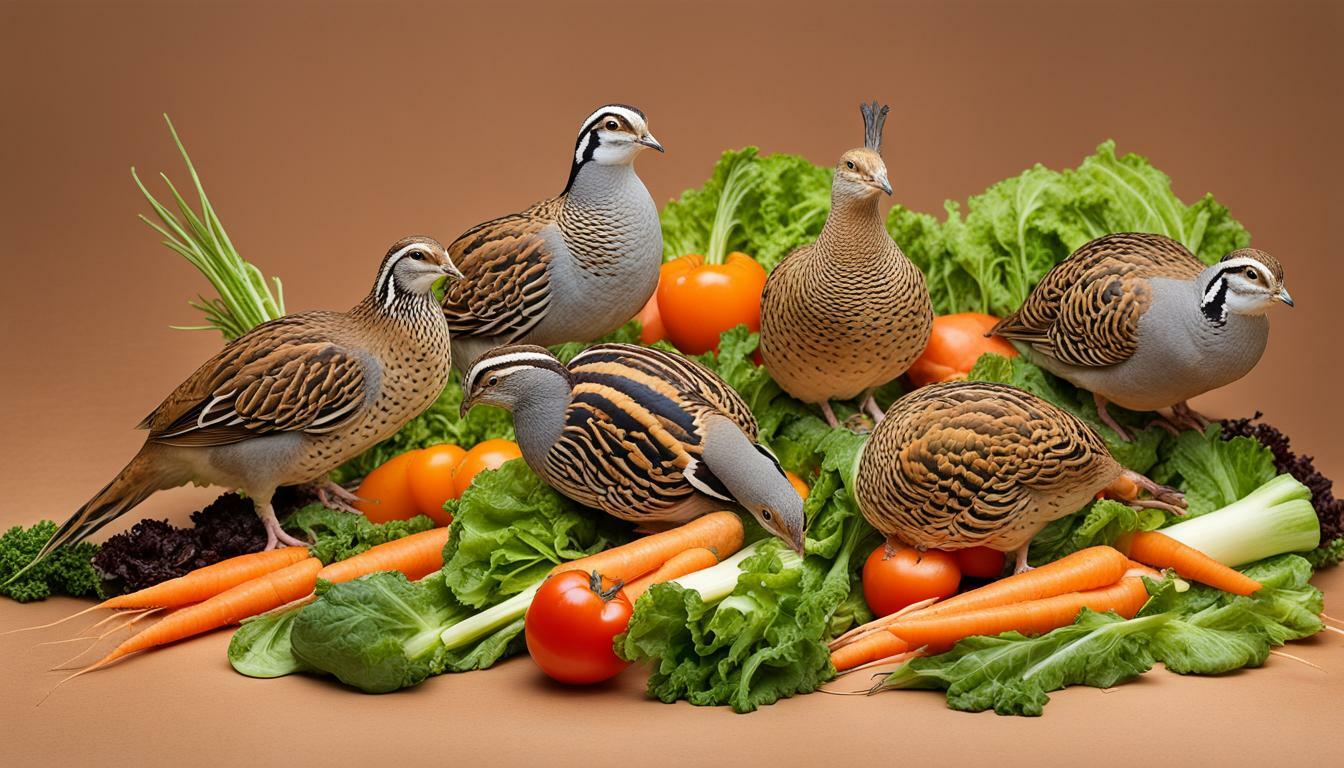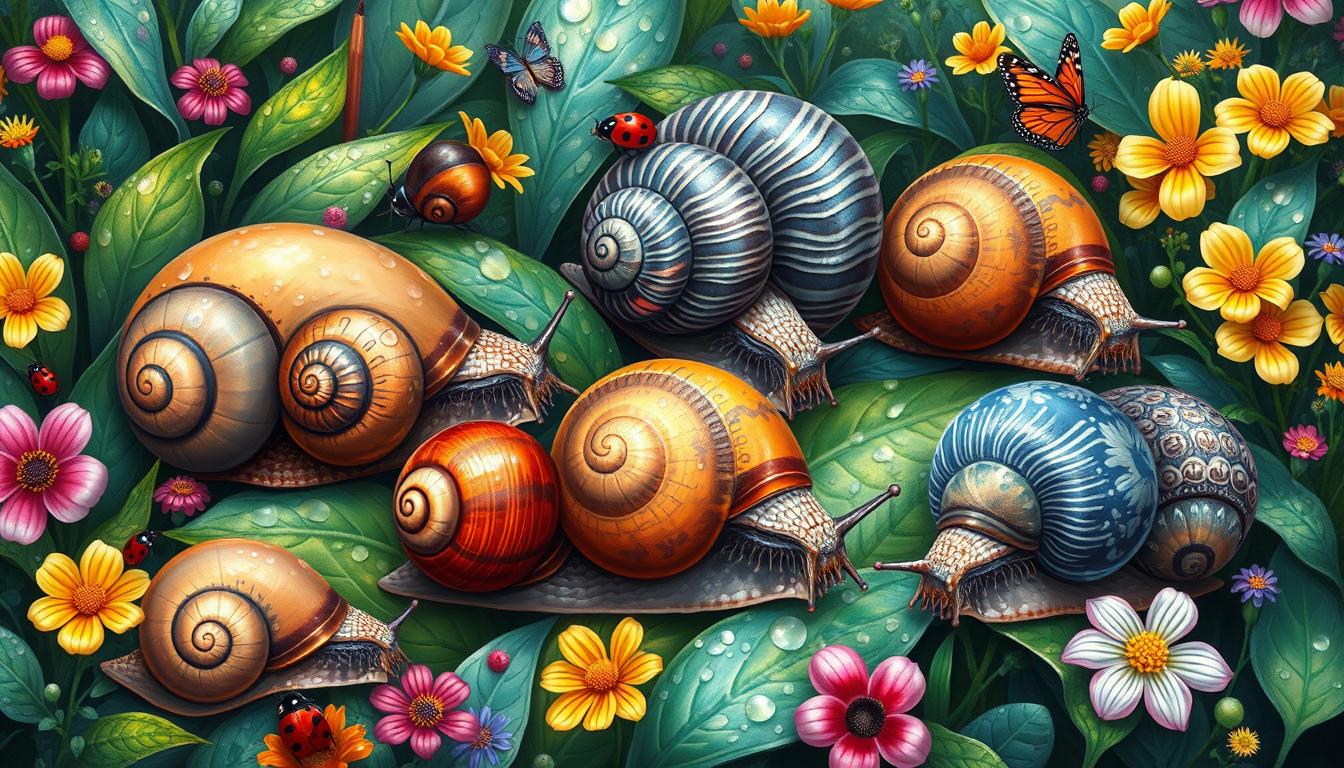What Vegetables Do Quails Eat? A Comprehensive Guide

Table of content:
- What are the best vegetables for quails?
- What fruits and vegetables can quails eat?
- What do quails eat in the wild?
- What vegetables are toxic to quails?
- How often should you feed vegetables to quails?
- Do quails eat leafy greens?
- Can quails eat raw or cooked veggies?
- What is the best way to feed veggies to quails?
- Should you chop up vegetables for quails?
- Do quails need fresh veggies daily?
- Final Thoughts
Quails are small game birds that can be raised for meat and eggs. Quails need a balanced diet with carbohydrates, proteins, vitamins and minerals. An important part of their diet should consist of fresh vegetables and leafy greens. Choosing the right vegetables to feed your quails is crucial for their health.
What are the best vegetables for quails?
The most nutritious vegetables for quails include:
- Lettuce – Romaine, green leaf, red leaf. High in vitamin A, potassium and folate.
- Kale – Curly kale, purple kale. Excellent source of vitamins A, C and K.
- Spinach – Packed with vitamin C, beta-carotene, iron and calcium.
- Broccoli – High in vitamin C and fiber. Florets and leaves can be fed.
- Cauliflower – Good source of vitamin C and folate. Leaves and florets are safe.
- Cabbage – Red or green varieties. Rich in vitamin C and anthocyanins.
- Brussels sprouts – Loaded with vitamin K, vitamin C, folate and antioxidants.
- Green beans – Full of vitamin C, vitamin K and manganese. Both leaves and pods can be fed.
These vegetables provide quails with important vitamins, minerals and phytonutrients. Feed a variety for balanced nutrition. Chop or mash for easier consumption.
What fruits and vegetables can quails eat?
In addition to leafy greens, quails can eat a variety of other fruits and vegetables:
- Peas – Snow peas, sugar snap peas. Good source of vitamin C, A and fiber.
- Carrots – Rich in beta-carotene, vitamins and minerals. Can be grated or chopped.
- Beets – High in folate, manganese and potassium. Leaves are also edible.
- Sweet potatoes – Loaded with vitamin A, vitamin C, B6 and fiber. Cook before feeding.
- Squash – Butternut, acorn, pumpkin. High in vitamins A and C. Seeds removed.
- Zucchini – Provides vitamin C, calcium and manganese. Can be sliced, grated or chopped.
- Cucumber – Cucumber with skin has vitamin K, potassium and antioxidants.
- Tomato – Excellent source of vitamin C, lycopene, beta-carotene. Cherry or grape tomatoes can be fed whole.
- Bell peppers – Red, yellow, orange peppers have high vitamin C and beta-carotene.
- Eggplant – Has B vitamins, potassium, fiber and anthocyanins. Skin removed.
- Mushrooms – Button, cremini, Portobello. Provide B vitamins like riboflavin and selenium.
- Berries – Strawberries, blueberries, raspberries. Packed with antioxidants and phytonutrients.
Fruits should be limited to 10% of their diet. Too much fruit can cause loose droppings. Remove any seeds, pits or harmful parts first.
What do quails eat in the wild?
In their natural habitat, quails are omnivores and eat a varied diet including seeds, grains, berries, leaves, buds, and small insects.
Wild quails forage on the ground for seeds and grains like millet, amaranth, foxtail, lamb’s quarters, wild buckwheat, and purslane. They eat available berries and fruits like elderberries, blackberries, mulberries and wild grapes.
Their diet consists of leafy matter from various weeds, grasses, forbs, agricultural crops and woody browse. Buds and flowers from trees and shrubs are also consumed.
Insects like beetles, caterpillars, ants, grasshoppers, crickets and other small bugs provide protein. Earthworms, snails and spiders may also be eaten.
Access to fresh vegetation, seeds and insects allow wild quails to maintain good health and body condition. Their diverse natural diet serves as a model for balanced nutrition in captivity.
What vegetables are toxic to quails?
Some vegetables can be poisonous or toxic to quails and should be avoided:
- Avocados – Persin toxin causes heart damage and death.
- Raw green potato skins – Contain solanine, a neurotoxin.
- Raw beans – Kidney, lima, navy, etc. Contain lectin phytohaemagglutinin.
- Raw rhubarb leaves – Have oxalic acid crystals which cause kidney failure.
- Raw sweet potatoes – Have oxalates which disrupt calcium absorption.
- Dried or wilted vegetables – May contain increased oxalates.
- Mushrooms other than commercially grown – Can be poisonous.
- Nightshades – Tomato, eggplant, pepper leaves and stems have alkaloids.
- Cruciferous veggies – Kale, cabbage, broccoli, etc. Goitrogens may impact thyroid function.
Only feed vegetables and parts of the plant known to be safe. When in doubt, leave it out. Cook, blanch or wilt high oxalate veggies to reduce risks.
How often should you feed vegetables to quails?
Quails need access to fresh vegetables daily as part of a balanced diet. Leafy greens, vegetables and other plants should comprise around 20-30% of their total food intake.
Fresh veggies can be offered once or twice per day. In commercial quail operations, greens are often provided in the morning and vegetables in the afternoon.
For backyard quails, aim to feed a minimum of 1-2 tablespoons of chopped greens per bird per day. Larger amounts of veggies can be offered to free range birds that forage for other foods.
Rotate different types of vegetables and leafy greens so quails get a variety of nutrients. Consumption may vary based on individual bird preferences. Remove any decaying produce to prevent mold and bacteria.
Monitoring intake and bird health will help determine optimal vegetable quantities and feeding frequency for your flock. Adjust amounts as needed to maintain good condition.
Do quails eat leafy greens?
Yes, quails readily consume leafy greens as part of their diet. Some good options include:
- Lettuce – Romaine, red leaf, green leaf, butterhead. Remove any wilted outer leaves.
- Spinach – Packed with nutrition. Can feed raw or lightly cooked.
- Kale – Curly green or purple varieties. Chop stems and leaves finely.
- Collard Greens – Rich source of calcium, vitamins A, C and K.
- Swiss Chard – Red or rainbow chard for variety.
- Cabbage leaves – Red, green, napa, bok choy. Shred before feeding.
- Broccoli and cauliflower leaves – Chop florets too.
- Sprouts – Alfalfa, clover, radish, broccoli, pea shoots.
Rinse any grit or debris off greens before feeding. Avoid wilted or spoiled leaves which can harbor mold. Introduce new additions slowly.
Can quails eat raw or cooked veggies?
Quails can eat both raw and cooked vegetables. There are pros and cons to each method:
Raw vegetables contain more vitamins, enzymes and nutrients. Many can be fed fresh without issue. Go light on high oxalate kinds like sweet potatoes.
Cooked vegetables are easier to digest. Cooking neutralizes compounds in cruciferous greens that may affect the thyroid gland if fed raw. Blanching also reduces oxalates.
Mashing or grating makes some veggies safer and easier to eat. Good options are carrots, beets, squash and pumpkin. Lightly steam or microwave to soften before mashing.
For mixed flocks, cook any veggies being shared to neutralize potential antinutrients. Avoid overcooking which destroys vitamins and phytonutrients.
Feed a combo of raw and cooked vegetables for variety. Monitor bird health and droppings for any issues. Adjust preparation as needed.
What is the best way to feed veggies to quails?
Some tips for safely feeding vegetables to quails include:
- Wash all produce thoroughly before preparing to remove dirt and contamination.
- Chop, shred, grate or mash harder vegetables into bite-size pieces.
- Lightly steam cruciferous or high oxalate veggies to reduce potential adverse effects.
- Mix small amounts of new vegetables with familiar foods to encourage trying.
- Spread veggies out in feeders or hang leafy greens within reach to prevent crowding.
- Remove any decaying produce promptly to prevent moldy feed.
- Avoid sudden large increases in higher-gas veggies like cabbage; gradually transition.
- Ensure adequate grit and oyster shell is available to aid digestion.
- Feed more greens and veggies in spring and summer when actively foraging. Reduce portions in fall and winter.
- Observe droppings and health to identify any issues with particular ingredients.
With some precautions, most vegetables can be part of a healthy, balanced diet for backyard or homestead quails.
Should you chop up vegetables for quails?
Chopping up vegetables into smaller pieces makes them easier for quails to eat and digest:
- Dicing, grating or shredding reduces choking risks from large, stringy pieces.
- Smaller particles mean more surface area for digestive enzymes to break down cell walls.
- Uniform sizing prevents competition among flock members for desirable bites.
- Mash or puree hard veggies like sweet potatoes, squash and carrots to make them safer and more palatable.
- Run leafy greens like kale or chard through a food processor for tiny pieces without spines.
- Some birds enjoy pecking at bigger chunks too. Provide a mix of textures.
Monitor to ensure chopped produce does not become slimy or rot before consumption. Refrigerate any unused portions.
For chicks under 3 weeks old, finely mince or puree veggies into crumbles they can easily swallow and digest. Gradually introduce larger pieces as they mature.
Do quails need fresh veggies daily?
Access to fresh, high-quality vegetables on a daily basis is ideal for quails to meet their nutritional requirements.
Leafy greens and certain veggies provide beneficial vitamins, minerals and antioxidants that are best obtained from live sources. These include:
- Vitamin C – Fresh dark greens, broccoli, peppers. Degrades over time.
- Vitamin K – Leafy greens like kale and spinach have high levels.
- Beta-carotene – Converts to vitamin A. Found in orange and dark pigmented veggies.
- Folate – Important for reproduction and DNA synthesis. Highest in fresh produce.
- Antioxidants – Phytonutrients that reduce disease risk. Diminish in cut, stored veggies.
While pellets can form a diet base, supplements don’t completely replace the value of varied fresh foods. Strive to offer a rotating selection of rinsed greens, vegetables, sprouts and edible flowers from your garden daily for flock health and vitality.
Final Thoughts
From leafy greens to fruits and vegetables, quails enjoy a wide variety of fresh produce as part of a balanced diet. Feed a diverse mix of lettuces, kale, peas, beets, zucchini and other veggies daily. Avoid toxic plants, introduce new foods slowly, and chop or cook produce as needed. With proper nutrition, fresh vegetables and greens help maintain healthy, productive quail flocks.
Welcome. I’m Adreena Shanum, the proud owner of this website, and I am incredibly passionate about animals, especially poultry. I founded adreenapets.com as a labor of love, stemming from my desire to share my knowledge and experiences with poultry enthusiasts worldwide.




